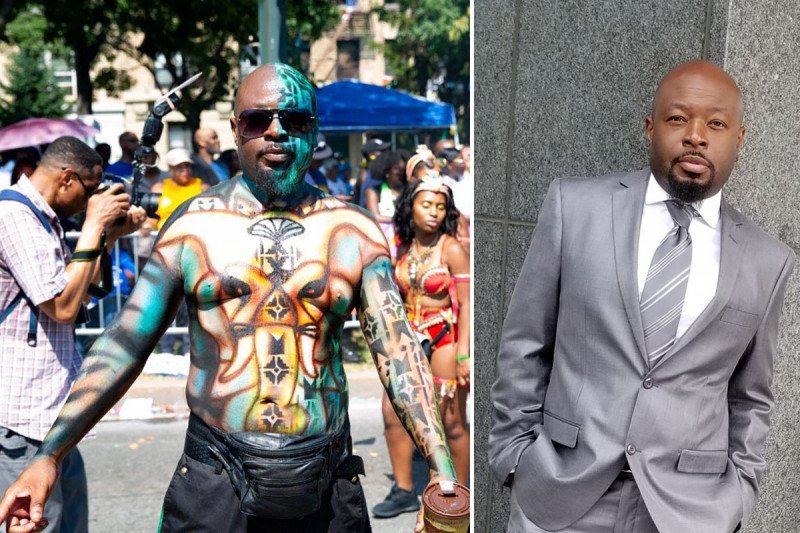
When Kirt Robinson, now age 43, started feeling pain in his neck about three years ago, he thought that he’d pulled a muscle while working out. After three months of increasingly severe pain, he noticed a large bump near his collarbone and finally decided to see his doctor.
“I’m very stubborn. It took me a while to admit how bad it had gotten,” says the longtime Brooklyn resident and native of Guyana. “I couldn’t raise my arm over my head to put on a T-shirt. I couldn’t turn my neck. The pain was sometimes excruciating.”
His doctor ordered a needle biopsy of the tumor. When the results were inconclusive, Kirt was referred to a head and neck specialist for a surgical biopsy. His tumor sample was then sent to pathologists at Memorial Sloan Kettering for analysis.
Diagnosed with a Rare Tumor
The experts at MSK determined that Kirt had a desmoid tumor. Desmoid tumors, also called aggressive fibromatosis, are rare growths that usually occur in the arms, legs, or torso. Fewer than 1,000 cases are diagnosed every year in the United States. Most people who are diagnosed with a desmoid tumor are in their teens, 20s, or 30s, and the tumor is more common in women than in men, although experts don’t know why.
Desmoid tumors are a type of soft tissue sarcoma. Unlike most forms of sarcoma, they are not considered cancerous, as they don’t spread to other parts of the body like the lungs, liver, and other organs. They can, however, cause severe pain and other symptoms and may be life-threatening depending on their location.
When surgically removed, desmoid tumors often come back. If surgery is not possible or requires something drastic, like an amputation, a variety of treatments are used. These include hormonal therapies and traditional chemotherapies. Because desmoid tumors are so hard to treat, MSK researchers have focused on new approaches, such as targeted therapies.
After the diagnosis, Kirt first saw a surgeon at MSK. He learned that his tumor was not operable because of its location next to critical areas, like nerves and blood vessels in his neck. His surgeon told him that he might be eligible for a clinical trial. After that, Kirt went to see MSK medical oncologist Mrinal Gounder. Dr. Gounder is an expert in desmoid tumors and other types of soft tissue sarcoma.
The Opportunity to Participate in a Groundbreaking Trial
Kirt was concerned about having chemotherapy, so he was happy to learn that Dr. Gounder was leading a clinical trial for a different kind of drug. The trial was the first to evaluate the use of a pill called sorafenib (Nexavar®) to treat desmoid tumors. Sorafenib is a targeted therapy that was originally developed to treat kidney cancer, but it is also known to block proteins that frequently drive the growth of desmoid tumors. Targeted therapies tend to have fewer side effects than chemotherapy because their activities in cells are more specific.
Kirt was one of 87 people to participate in the trial, the results of which are now being published in the New England Journal of Medicine. The phase III study reported that there was a benefit of more than seven-fold in people who took sorafenib compared with those who didn’t. The drug helped stop tumor growth for an average of nearly two years. Many of the patients had their tumors shrink significantly, including Kirt. People who didn’t get the drug in the first part of the trial were able to later receive it, and many of them benefited as well.
“Until now there hasn’t been a standard way to treat people with desmoid tumors, and there haven’t been many studies on them because it’s such a rare disease,” Dr. Gounder says. “As it’s become increasingly clear that surgery is not the best way to treat these tumors, the need to find different approaches has become more apparent.”
Dr. Gounder’s trial came about in an unconventional way. After he published a paper in 2011 describing a few patients with desmoid tumors who had been given access to sorafenib under a compassionate use program, he was contacted by the Desmoid Tumor Research Foundation, a patient advocacy group. The group’s leaders encouraged him to conduct a phase III trial and assisted with recruiting participants. The trial ultimately included people treated at nearly 25 hospitals in the United States and Canada.
Dr. Gounder says it is now up to Bayer, the company that makes sorafenib, to decide whether to apply to the US Food and Drug Administration to get the drug officially approved for desmoid tumors. Since its approval for kidney cancer, the drug has also been approved for liver and thyroid cancers.
A Return to Normal Life
Kirt is feeling much better since going on the drug, which he still takes. He needs some physical therapy to regain full mobility of his arm and hand, but he no longer has pain and is able to get restful sleep again.
The side effects from the drug have been minor and manageable. They include occasional rashes, high blood pressure, and diarrhea, all of which affected many other people in the trial. He has also experienced tingling in his hands and feet and changes in skin pigmentation.
He has returned to many of his regular activities, including participating in New York City’s annual West Indian Day Parade, of which he has been an active participant for many years. He’s even grateful to be able to do mundane chores again, like cleaning his bathroom.
“It’s by the grace of God that I found MSK and Dr. Gounder,” Kirt says. “It was really by happenstance that I stumbled upon the opportunity to participate in this trial, which has impacted me in such a positive way.”





